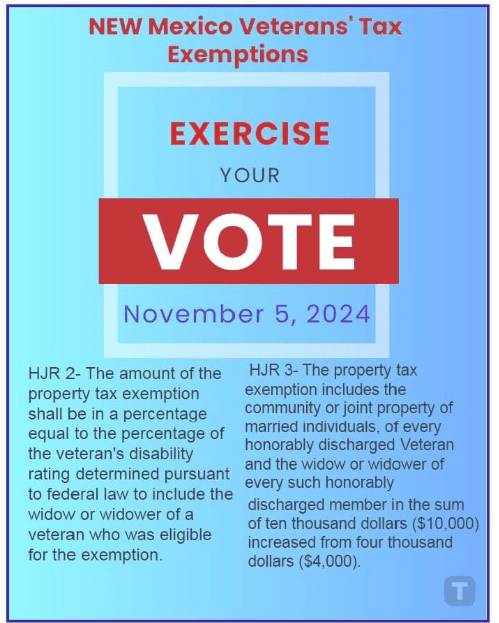On October 15, veterans across New Mexico, including myself, received an email from the Department of Veterans Services regarding two amendments on the ballot for the upcoming general election. The email, sent from Deputy Secretary Eric James using an official state email, outlined the benefits of these amendments to veterans. While on the surface this may appear as simple outreach, I found it highly problematic and likely a case of electioneering—using public resources to promote a particular political outcome.

The email in question highlighted two ballot amendments affecting veterans:
- Amendment 1: Extending property tax exemptions to veterans who are less than 100% disabled and their surviving spouses, in proportion to their disability rating.
- Amendment 2: Increasing the property tax exemption for veterans from $4,000 to $10,000.
The problem is not the information itself but rather the way it was presented. The email promoted the benefits of these amendments to veterans without offering any analysis of potential drawbacks or the broader impact on taxpayers. This one-sided approach, sent using state resources, appears to advocate for the amendments, thus crossing into the realm of political advocacy.
Electioneering and the Use of Public Resources
New Mexico law provides clear restrictions on political activities by state agencies and public employees. According to New Mexico Statutes Section 10-16-3.1 of the Governmental Conduct Act, public officers and employees are prohibited from using state property for political purposes. Specifically, it states:
“A public officer or employee is prohibited from… using property belonging to a state agency or local government agency, or allowing its use, for other than authorized purposes.”
The email from James clearly uses state resources—an official email system and veterans’ contact information stored in a government database—to send what appears to be an advocacy message. This violates the expectation that public resources are to be used impartially, especially during election periods.
Moreover, New Mexico Statutes Section 1-20-16 of the New Mexico Election Code prohibits electioneering, defined as campaigning for a candidate or question, including electronic solicitation. While this statute primarily addresses activities near polling places, its spirit extends to any attempt by government bodies to influence voter decisions using public resources.
Government agencies, including the Department of Veterans Services, should provide neutral and factual information about voting processes, ensuring that all sides of an issue are presented fairly. The email in question, promoting only the positive aspects of the amendments and ignoring the negative aspects, failed to meet this standard. In doing so, it potentially undermines public trust in the agency’s neutrality and fairness.
Conclusion
The Department of Veterans Services should be held accountable for using its resources inappropriately during an election period. While providing voting information to veterans is crucial, it must be done in a manner that remains neutral, avoids advocacy, and fosters public trust in the electoral process. I have raised this issue directly with the department and continue to encourage all New Mexicans to remain vigilant about the integrity of our election processes, particularly when public agencies are involved.
To maintain the public’s faith in our government’s neutrality, it is essential that public resources remain free from political advocacy. As voters, we deserve balanced information that empowers us to make informed decisions—not one-sided messaging from the very institutions sworn to serve us.

- Opinion | SB 218—New Mexico’s Promise Made, Promise Broken - February 24, 2025
- New Mexico’s Supreme Court Ignores Rights and Restricts Who Can Hear Election Cases - January 9, 2025
- Progressive Blueprint: How EMERGE’s Legislative Surge is Poised to Reshape New Mexico - January 6, 2025


